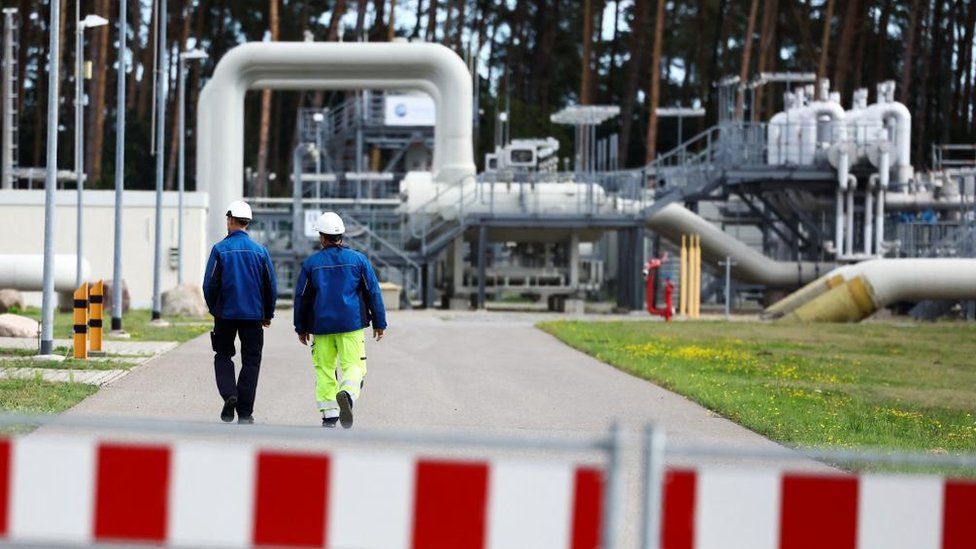Ukraine war: Russia to keep key gas pipeline to EU closed
- Published

Russia's main gas pipeline to Europe will not reopen as planned on Saturday, adding to concerns about energy supplies this winter.
State energy firm Gazprom said it found a leak on Nord Stream 1, meaning it could be closed indefinitely.
The pipeline, which runs to Germany, has been shut for three days for what Gazprom described as maintenance work.
Europe accused Russia of using its gas supplies to blackmail Europe amid the Ukraine conflict, which Moscow denies.
Energy prices have soared since Russia invaded Ukraine and scarce supplies could push up costs even further.
There are growing fears families in the EU will be unable to afford the cost of heating this winter.
The UK could also be affected. Although not reliant on Nord Stream 1 for its gas, the pipeline suspension could drive the cost of wholesale gas up further, which has been behind the spiralling rise in the energy price cap.
Faisal Islam, the BBC's economics editor, described the indefinite closure of Nord Stream 1 as a very serious development, noting that Russia had kept supplies into Europe flowing even at the height of the Cold War.
The stand-off with Russia has forced countries to fill their own gas supplies, with Germany's stores increasing from less than half in June to 84% full today.
As a result, international gas prices have fallen in the past week, but remain high by normal standards.
Europe is attempting to wean itself off Russian energy in an effort to reduce Moscow's ability to finance the war, but the transition may not come quickly enough.
EU Council President Charles Michel said Russia's move was "sadly no surprise".
"Use of gas as a weapon will not change the resolve of the EU. We will accelerate our path towards energy independence. Our duty is to protect our citizens and support the freedom of Ukraine," he tweeted.
Moscow denies using energy supplies as an economic weapon against Western countries supporting Ukraine.
It has blamed the sanctions for holding up routine maintenance of Nord Stream 1, but the EU says this is a pretext.
Germany's network regulator, the Bundesnetzagentur, said the country was now better prepared for Russian gas supplies to cease, but it urged citizens and companies to cut consumption.
Gazprom's announcement came shortly after the G7 nations agreed to cap the price of Russian oil in support of Ukraine.
The G7 (Group of Seven) consists of the UK, US, Canada, France, Germany, Italy and Japan.
Their introduction of a price cap means countries that sign up to the policy will be permitted to purchase only Russian oil and petroleum products transported via sea that are sold at or below the price cap.
However, Russia says it will not export to countries that participate in the cap.
The gas pipeline stretches from the Russian coast near St Petersburg to north-eastern Germany and can carry up to 170 million cubic metres of gas a day.
Watch: Ros Atkins On… How this year’s biggest stories connect
It is owned and operated by Nord Stream AG, whose majority shareholder is Gazprom.
Germany had also previously supported the construction of a parallel pipeline - Nord Stream 2 - but the project was halted after Russia invaded Ukraine.
Gazprom said the fault had been detected at the Portovaya compressor station, with the inspection carried out alongside workers from Siemens, the German firm that maintains the turbine.
It said that fixing of oil leaks in key engines was only possible in specialised workshops, which had been hindered by Western sanctions.
However, Siemens itself said: "Such leaks do not normally affect the operation of a turbine and can be sealed on site. It is a routine procedure within the scope of maintenance work."
This is not the first time since the invasion that the Nord Stream 1 pipeline has been closed.
In July, Gazprom cut off supplies completely for 10 days, citing "a maintenance break". It restarted again 10 days later, but at a much reduced level.
Speaking to the BBC from the Swiss capital Bern, an economist and energy analyst, Cornelia Meyer, said the gas shutdown would have a major impact on employment and prices.
"That really has huge ramifications for gas in Europe which is about four times more expensive than it was a year ago and this cost of living crisis will really soar because it's not just gas," she said. "Gas becomes fertiliser and it's used in many industrial processes, so that will affect jobs, and it will affect costs."
This is no coincidence. Russia's state-controlled gas giant announced an indefinite extension to a three-day maintenance halt to flows of gas through the continent's key energy artery, hours after leading western finance ministers vowed to escalate sanctions on Russian oil.
Gazprom's official reason is that an oil leak has been found and the pipeline cannot work without German imports of technology, which are now subject to sanctions.
Few observers believe, however, that this is anything other than an attempt essentially to blackmail Europe over supplies.
This is a very serious development. Even during the height of the Cold War, Russia kept supplies of its gas flowing into Europe.
This cut-off though - and the pointed attempt by Gazprom to blame the German energy giant Siemens for the malfunction - is the culmination of decades of dysfunction in the energy relationship between Russia and Germany.
- Published3 September 2022
- Published2 September 2022
- Published20 July 2022
- Published28 July 2022